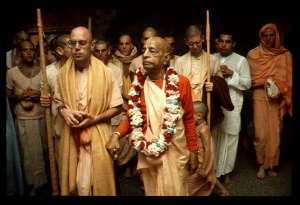SB 9.19.13

A.C. Bhaktivedanta Swami Prabhupada
TEXT 13
- yat pṛthivyāṁ vrīhi-yavaṁ
- hiraṇyaṁ paśavaḥ striyaḥ
- na duhyanti manaḥ-prītiṁ
- puṁsaḥ kāma-hatasya te
SYNONYMS
yat — what; pṛthivyām — within this world; vrīhi — food grains, rice; yavam — barley; hiraṇyam — gold; paśavaḥ — animals; striyaḥ — wives or other women; na duhyanti — do not give; manaḥ-prītim — satisfaction of the mind; puṁsaḥ — to a person; kāma-hatasya — because of being victimized by lusty desires; te — they.
TRANSLATION
A person who is lusty cannot satisfy his mind even if he has enough of everything in this world, including rice, barley and other food grains, gold, animals and women. Nothing can satisfy him.
PURPORT
Improvement of one's economic condition is the aim and object of a materialist, but there is no end to this material advancement, for if one cannot control his lusty desires, he will never be pleased, even if he gets all the material wealth of the world. In this age we see much material improvement, but still people are struggling to get more and more material opulence. Manaḥ ṣaṣṭhānīndriyāṇi prakṛti-sthāni karṣati (BG 15.7). Although every living entity is a part of the Supreme Being, because of lusty desires one continuously struggles for so-called betterment of one's economic condition. To have a satisfied mind, one must give up his heart disease of lusty desires. This can be done only when one is Kṛṣṇa conscious.
- bhaktiṁ parāṁ bhagavati pratilabhya kāmaṁ
- hṛd-rogam āśv apahinoty acireṇa dhīraḥ
- (SB 10.33.39)
If one becomes Kṛṣṇa conscious, then he can give up this heart disease; otherwise this disease of lusty desires will continue, and one cannot have peace in his mind.